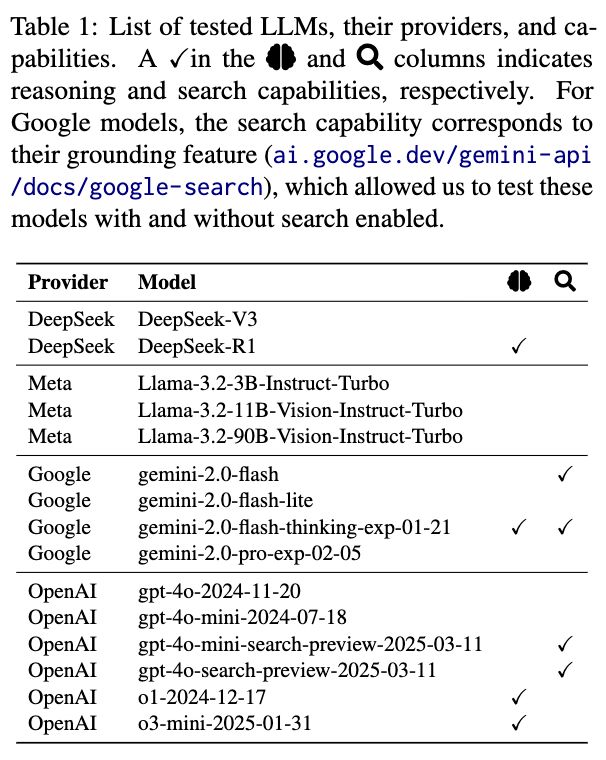
Across 3 experiments (n = 3,285), we found that interacting with sycophantic (or overly agreeable) AI chatbots entrenched attitudes and led to inflated self-perceptions.
Yet, people preferred sycophantic chatbots and viewed them as unbiased!
osf.io/preprints/ps...
Thread 🧵


matthewfacciani.substack.com/p/the-psycho...

matthewfacciani.substack.com/p/the-psycho...


@jayvanbavel.bsky.social and I wrote a column on our recent paper on the psychology of virality. Check it out here: www.powerofusnewsletter.com/p/why-some-i...

@jayvanbavel.bsky.social and I wrote a column on our recent paper on the psychology of virality. Check it out here: www.powerofusnewsletter.com/p/why-some-i...
I explain why some ideas go viral--but most don't with @steverathje.bsky.social
www.powerofusnewsletter.com/p/why-some-i...

I explain why some ideas go viral--but most don't with @steverathje.bsky.social
www.powerofusnewsletter.com/p/why-some-i...
Can LLMs with reasoning + web search reliably fact-check political claims?
We evaluated 15 models from OpenAI, Google, Meta, and DeepSeek on 6,000+ PolitiFact claims (2007–2024).
Short answer: Not reliably—unless you give them curated evidence.
arxiv.org/abs/2511.18749


Can LLMs with reasoning + web search reliably fact-check political claims?
We evaluated 15 models from OpenAI, Google, Meta, and DeepSeek on 6,000+ PolitiFact claims (2007–2024).
Short answer: Not reliably—unless you give them curated evidence.
arxiv.org/abs/2511.18749
Epistemic Fragility in Large Language Models: Prompt Framing Systematically Modulates Misinformation Correction
WGemini 2.5 Pro had 74% lower odds of strong correction than Claude Sonnet 4.5, highlighting epistemic fragility
arxiv.org/pdf/2511.22746
Epistemic Fragility in Large Language Models: Prompt Framing Systematically Modulates Misinformation Correction
WGemini 2.5 Pro had 74% lower odds of strong correction than Claude Sonnet 4.5, highlighting epistemic fragility
arxiv.org/pdf/2511.22746
#TuringTest #ChineseRoom #AIsycophancy
#TuringTest #ChineseRoom #AIsycophancy
Across 3 experiments (n = 3,285), we found that interacting with sycophantic (or overly agreeable) AI chatbots entrenched attitudes and led to inflated self-perceptions.
Yet, people preferred sycophantic chatbots and viewed them as unbiased!
osf.io/preprints/ps...
Thread 🧵

Across 3 experiments (n = 3,285), we found that interacting with sycophantic (or overly agreeable) AI chatbots entrenched attitudes and led to inflated self-perceptions.
Yet, people preferred sycophantic chatbots and viewed them as unbiased!
osf.io/preprints/ps...
Thread 🧵

🎥 Watch here on YouTube: www.youtube.com/watch?v=TFm3...
🎧 Listen on Spotify: open.spotify.com/episode/0Oi6...
🎥 Watch here on YouTube: www.youtube.com/watch?v=TFm3...
🎧 Listen on Spotify: open.spotify.com/episode/0Oi6...
I was on the @andrew-yang.bsky.social podcast to discuss the impact of social media.
We discussed what goes viral online, how it impacts our lives, and what we can do about it (with @steverathje.bsky.social):
www.youtube.com/watch?v=YrDV...

I was on the @andrew-yang.bsky.social podcast to discuss the impact of social media.
We discussed what goes viral online, how it impacts our lives, and what we can do about it (with @steverathje.bsky.social):
www.youtube.com/watch?v=YrDV...

Our new review paper on the PSYCHOLOGY OF VIRALITY is now out in @cp-trendscognsci.bsky.social (it was led by @steverathje.bsky.social)
Read the full paper here: www.cell.com/trends/cogni...

Our new review paper on the PSYCHOLOGY OF VIRALITY is now out in @cp-trendscognsci.bsky.social (it was led by @steverathje.bsky.social)
Read the full paper here: www.cell.com/trends/cogni...
is on the front cover of this month's issue of
@cp-trendscognsci.bsky.social.

is on the front cover of this month's issue of
@cp-trendscognsci.bsky.social.
Read @steverathje.bsky.social's new preprint to learn about how people actually feel towards overly agreeable chatbots.
OSF: osf.io/preprints/ps...
(summary in thread below!)

Read @steverathje.bsky.social's new preprint to learn about how people actually feel towards overly agreeable chatbots.
OSF: osf.io/preprints/ps...
(summary in thread below!)

Can social media contact reduce prejudice?
#PrejudiceResearch
psycnet.apa.org/fulltext/202...

Can social media contact reduce prejudice?
#PrejudiceResearch
psycnet.apa.org/fulltext/202...
Yet, people prefer sycophantic chatbots and see them as less biased
Only open-minded people prefer disagreeable chatbots: osf.io/preprints/ps...
Led by @steverathje.bsky.social

Yet, people prefer sycophantic chatbots and see them as less biased
Only open-minded people prefer disagreeable chatbots: osf.io/preprints/ps...
Led by @steverathje.bsky.social
Across 3 experiments (n = 3,285), we found that interacting with sycophantic (or overly agreeable) AI chatbots entrenched attitudes and led to inflated self-perceptions.
Yet, people preferred sycophantic chatbots and viewed them as unbiased!
osf.io/preprints/ps...
Thread 🧵

Across 3 experiments (n = 3,285), we found that interacting with sycophantic (or overly agreeable) AI chatbots entrenched attitudes and led to inflated self-perceptions.
Yet, people preferred sycophantic chatbots and viewed them as unbiased!
osf.io/preprints/ps...
Thread 🧵

Across 3 experiments (n = 3,285), we found that interacting with sycophantic (or overly agreeable) AI chatbots entrenched attitudes and led to inflated self-perceptions.
Yet, people preferred sycophantic chatbots and viewed them as unbiased!
osf.io/preprints/ps...
Thread 🧵

